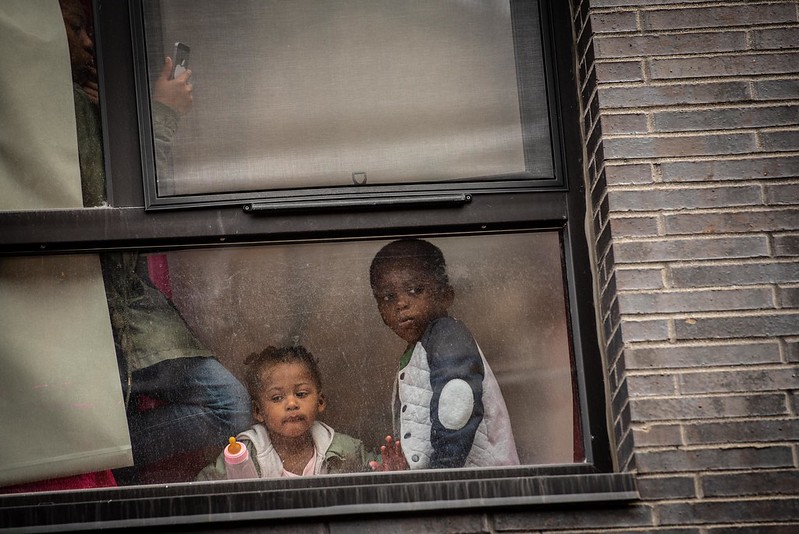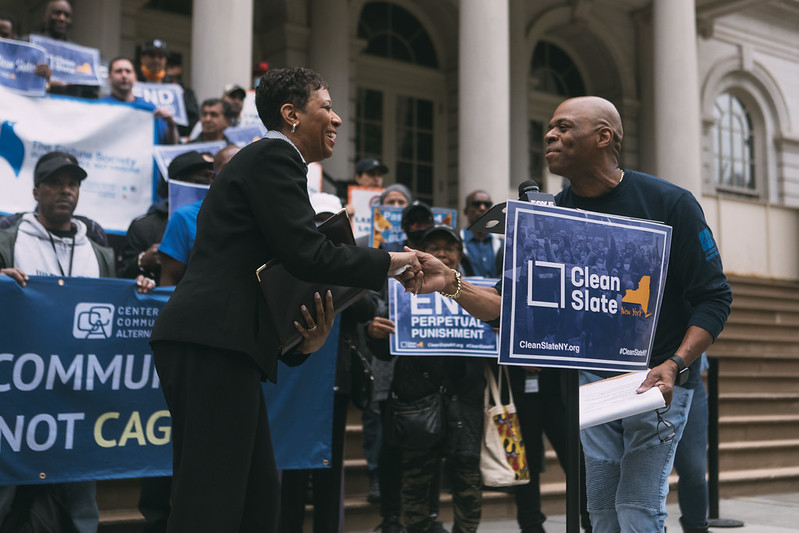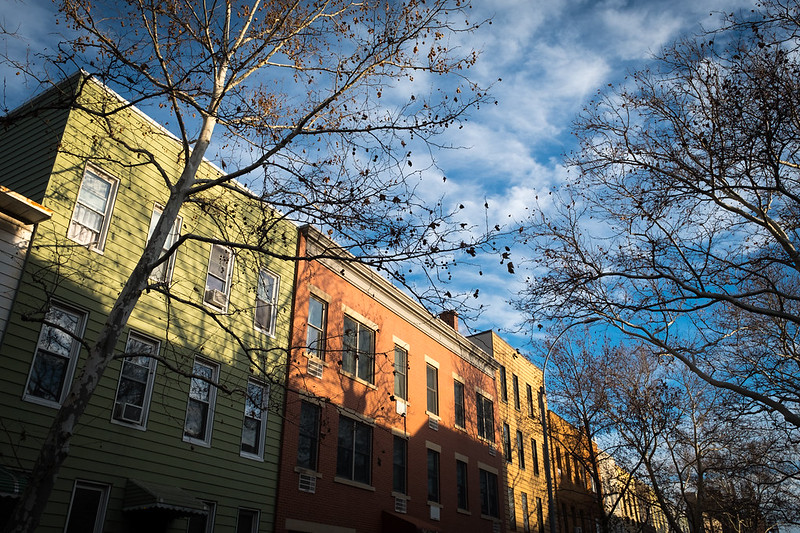Tenants are Struggling; New York Needs Good Cause Eviction Now

Tenants in New York City (photo: Michael Appleton/Mayoral Photography Office)
Tenants in New York are struggling. Rent prices are through the roof, rising more than 30% from last year. People are getting kicked out of their homes at rates we haven’t seen since before the pandemic.
Add to this the growing costs of inflation and a looming decision by the New York City Rent Guidelines Board to raise rents on stabilized apartments even higher, and you have the makings of a historic crisis for tenants across the board.
With just days left in the 2022 state legislative session, lawmakers in Albany must listen to the voices of tenants crying out for help by passing the Good Cause bill, which will give tenants the power to challenge outrageous rent hikes and unjust evictions.
With few protections in place for working families facing eviction, predatory landlords and private equity firms are using this moment to pad their bottom line. In New York, if you’re not in a rent-controlled or rent-stabilized apartment, your landlord can raise your rent as high as they want, whenever they want, and they can kick you out of your home for any reason, even as payback for raising safety concerns.
As a result, all across New York City, landlords that are essentially private equity firms in disguise have been jacking up rents as high as 100% when tenants go to renew their leases and evicting long-time tenants with virtually no notice, all to flip properties and make a profit.
Take the case of Irene Cepeda, a Make the Road New York member who has lived in the same apartment in Bushwick for 22 years and paid her rent on time every month. Irene is now facing a sudden rent hike of $1,200 per month, which amounts to the same thing as an eviction. Her kids are worried sick about the prospect of moving away from the neighborhood they grew up in.
Good Cause would protect tenants like Irene getting hit with sticker shock when they renew a lease. The legislation ties rent increases to the rate of inflation, requiring landlords to justify rent hikes greater than 3% or 150% of the Consumer Price Index. And if a landlord wanted to deny a lease renewal, they would need to be prepared to justify it in court.
Not only does Good Cause give tenants more power to fight outrageous rent hikes, but it also empowers tenants to demand repairs and speak out against harassment without fearing retaliation from their landlord. Such retaliation is all too common right now. Weeks ago, for example, New York Attorney General Letitia James sent a scathing memo calling out landlords for trying to crack down on tenants who have been organizing for safer conditions.
We’ve seen it in our own neighborhoods. Another Make the Road New York member, Grisel Pacheco, was forced to leave her apartment in Ridgewood after her landlord refused to repair a broken kitchen sink pipe. She and her three children needed to move to a new neighborhood, far from their schools and support network.
Evictions aren’t just harmful for those who lose their homes. They make it harder for children to succeed in school. They destroy support networks and communities. And they make our neighborhoods less safe. Good Cause isn’t just about protecting tenants - it’s about keeping our communities healthy and safe.
If you’re a landlord playing by the rules, you have nothing to fear from this bill. Good Cause wouldn’t stop landlords from taking action against tenants who are disruptive or who refuse to pay the rent, nor would it deny landlords the right to deny a lease renewal to occupy a unit themselves or have a family member move in.
What this bill would do is provide real relief to tenants who are facing unsustainable rent hikes and provide protections from abusive and predatory landlords. New York’s Congressional delegation and more than a dozen of the state’s largest labor unions support this bill. Multiple cities in New York, including Albany and Poughkeepsie, have passed their own version of Good Cause.
The pandemic has left working families in New York in survival mode for the past two years, on top of what was already an affordable housing crisis where so many were severely rent-burdened and one large rent increase away from losing their homes.
We have just days left in the state legislative session to make a difference for tenants and accelerate our recovery. We can rebuild our state and ensure that all New Yorkers can keep a safe roof over their heads without fear of harassment or eviction. It’s time to pass Good Cause.
***
Julia Salazar is a State Senator representing the 18th district in Brooklyn. Jose Lopez is the Co-Executive Director of Make the Road New York. On Twitter: @JuliaCarmel_ & @JLopez_MRNY.
***
Have an op-ed idea or submission for Gotham Gazette? Email This email address is being protected from spambots. You need JavaScript enabled to view it.
'Clean Slate' Will Create a More Equitable and Inclusive New York

A rally for the Clean Slate Act (photo: Emil Cohen/NYC Council Media Unit)
With the end of this year’s legislative session in Albany quickly approaching, we must seize the opportunity to pass critical reforms that will have a real impact on advancing racial and economic equity in our state. The Clean Slate Act holds the potential for meaningful progress in our fight for justice, directly impacting 2.3 million New Yorkers. The passage of this bill by the State Legislature will affirm New York’s principles and prioritization of equity, and it is past time for serious legislative action to afford fairness and dignity to all our residents.
Since 1922, FPWA has fought to achieve social and economic well-being for greater New York’s most vulnerable by advocating for just public policies and strengthening human service organizations. Each year, we reach approximately 1 million New Yorkers through our more than 170 member organizations.
Our centennial year marks an unprecedented moment in New York’s history; as we emerge from a public health and economic crisis, race-based inequities and the deepened needs of New Yorkers have been laid bare. FPWA is committed to advancing policies that will bring impactful and sustainable change, which is precisely why we strongly support and call for the immediate passage of the Clean Slate Act (S.1553C/A.6399B), sponsored by Assemblymember Catalina Cruz and Senator Zellnor Myrie.
Where individuals have have completed their sentences and have no new criminal convictions during the waiting period, the Clean Slate Act would automatically seal misdemeanor conviction records after three years and felony conviction records after seven years for all convictions except sex offenses. With this reform, criminal records will be sealed for civil purposes with some exceptions such as for gun licensing. To be eligible under Clean Slate, a person must have served their full sentence and cannot be on community supervision, including probation and parole.
It is simple: the Clean Slate Act would allow an eligible person who has served their time and paid their dues the opportunity to fully invest in their rehabilitation by giving them a fresh start; a clean slate. A clean slate that would remove known debilitating barriers to employment, housing, and education, and allow access to critical supports necessary for real mobility and opportunity.
This is not just a matter of economic justice. This is a matter of morality, of redemption, and of dignity. Even after serving their sentences and returning to their communities, too many with convictions live in a state of perpetual punishment that tears families apart and maintains a painful cycle of intergenerational trauma and economic insecurity.
The impact of this continued and additional punishment beyond sentences already served reverberates across children, families, and entire communities. Children that grow up in poverty are far more likely to remain living in poverty throughout their lives. By lifting the barriers to full participation, individuals can obtain the jobs and housing necessary to lift their households out of poverty. By design, our systems - including the legal system - criminalize poverty. Today, our brothers and sisters return to their communities to find themselves locked out of opportunity, locked out of the very essentials that we all need to live with dignity – a job, a secure roof over our heads, an education. How is this justice?
If we are committed to advancing equity and inclusion in New York, we must take steps to end the perpetual punishment of those who are justice-involved. Clean Slate offers the only path forward for New York. Clean Slate is an inclusive, common-sense bill that will have an immediate impact on the quality of life for New Yorkers in every corner of the state. It is an anti-poverty bill with broad-based support that will strengthen our state's economy.
At the heart of the Clean Slate movement are human beings — 2.3 million New Yorkers and their loved ones — suffering from the ongoing and often permanent bar against full participation in economic and civic life.
By helping to ensure that all New Yorkers can access stable employment and housing at a time when they are most needed, Clean Slate will revitalize our communities, which are safest when basic needs are met and individuals have the resources necessary to thrive.
As a state, we herald the principles of redemption and rehabilitation, but we are not allowing people to move beyond their past mistakes. Supporting Clean Slate simply does just that. Justice must not be delayed any longer for the 2.3 million New Yorkers held as prisoners by their convictions and subjugated to a lifetime of inequity.
***
Raysa S. Rodriguez is Chief Program and Policy Officer, FPWA. On Twitter @FPWA.
***
Have an op-ed idea or submission for Gotham Gazette? Email This email address is being protected from spambots. You need JavaScript enabled to view it.
Affordability, Good Cause Eviction, and the Costs of the Housing Ecosystem

Housing (photo: Edwin J. Torres/ Mayor's Office)
No matter who you are, these past two years have been difficult for New Yorkers across the state. The COVID-19 pandemic was not only a health crisis where we lost tens of thousands of our loved ones, but also an affordability crisis. Too many of our neighbors lost jobs, routines, social connections, and more. Hundreds of thousands were thrown into economic instability, made even more difficult by circumstances that predated the pandemic: the housing crisis.
Everywhere you look, it’s painfully obvious that our city’s housing ecosystem is on the brink. At the same time as property values in some neighborhoods approach unheard of highs, tenants in other neighborhoods contend with stagnant wages and rent increases beyond their means. All around us, new luxury developments are springing up while efforts to increase the supply of truly affordable housing — housing that working families can afford to rent or own — fail to live up to their promise and costs.
In a city as large and resource-rich as ours, no individual or family should have to confront the painful reality of being unable to afford a home. No one should be unhoused. No one should be forced to lose their home because it becomes exorbitantly overpriced or without good cause or justification. Everyone should be entitled to a safe and healthy home that is within their means to afford.
Conversations and advocacy around the housing affordability crisis in our city and state typically focus on limiting rent increases, preventing evictions, and the imperative to build more truly affordable housing. And these conversations, while incredibly important, don’t address all of the factors that contribute to a wildly astronomical housing market and drive out working- and middle-class families from neighborhoods all across our city. Any long-term solution to our housing crisis that truly gets to the heart of affordability should also take into account rising property taxes, one of the chief reasons for rent increases and a lack of new affordable housing.
Property taxes are usually only thought of as a part of a homeowner’s affordability calculus but they play a significant role in contributing to the lack of affordable rental housing in New York City. We live in a delicate housing ecosystem where one person’s rent payment is another person’s income, which becomes a mortgage payment, an insurance payment, a water bill payment, a property tax payment, and so on. This means when costs go up, it affects both tenant and owner alike. Simply put, exorbitant costs and property taxes levied upon us by the city push up the price of our rents.
Neighborhoods in and around my district are not immune to the effects of the city’s broken property tax system. I surveyed the public property tax records of 40 three- and four-unit buildings for the last four years across three southern Brooklyn neighborhoods: Bay Ridge, Bath Beach, and Sunset Park. Three-fourths of the buildings I surveyed had two or more consecutive years of at least 5% property tax increases. One building in Bay Ridge saw its property tax bill go up 19% over two years; another in Sunset Park saw a whopping 24% increase over three years; two in Bath Beach had nearly 20% increases over three years.
The inequities of our property tax system are real. They affect the affordability of our communities, for both homeowners and tenants, alike. Do these increases justify exorbitant 100% rent hikes, as we’ve seen in some parts of the city this past year? Of course not. But we can’t ignore the impact that property taxes have on the housing ecosystem, including how they affect rent prices, and especially in outer-borough communities. These costs, just like many of the other factors that go into housing expenses, need to be taken into account when we determine whether rents are fair and affordable, or not. Not taking all of these factors into account will just result in an ecosystem that is out of balance and without a sustainable financial underpinning.
In the remaining days of the state legislative session this year, there is a lot of advocacy in support of S3082, the Good Cause Eviction bill. In a nutshell, the bill would prohibit a landlord from evicting a tenant without good cause, and would allow a tenant the right to renew a lease. Failing to pay rent is good cause for an eviction, unless the tenant is not paying rent because the rent has been unreasonably increased. The bill establishes that a rent increase is presumed to be unreasonable if it exceeds 3% or 1.5x the annual rate of inflation as measured every August, whichever is greater. Broadly speaking, this bill would apply to apartments that are not rent-stabilized and not owner-occupied.
While I fully support the principle behind this bill - the idea that a tenant shouldn’t be evicted without good cause - and that rent increases should be reasonable and justifiable - I don’t think the calculation of what is or is not reasonable accurately reflects the true costs of housing. Linking increases to a factor of the inflation rate - or a flat amount of 3% - is a good step towards recognizing that housing costs inevitably go up. But those calculations don’t account for property tax increases, which in many cases bear no relation to inflation.
Looking at New Jersey, which is a model that many advocates point to in support of enacting the Good Cause Eviction bill, the law requires full consideration of all the expenses - and inversely, profitability - of a landlord in determining what is or is not reasonable.
Take 2019 as an example, when the annual inflation rate was 1.8%. Under the current Good Cause Eviction bill, rent increases up to 3% would be presumed reasonable (1.5x the inflation rate=2.7%, which is less than 3%). But in that same year, 30 out of the 40 buildings I surveyed had property tax increases greater than 6% alone. So while the presumed 3% increase would be used to pay for added costs associated with the housing market such as fuel, water, insurance, etc.,the total cost of the tax increases would be more than double what would be presumed to be reasonable.
Tenants absolutely need to be protected from unreasonable and unjustified rent increases. But any effort to protect tenants has to be done in a way that is financially sustainable to the underpinning of the totality of the housing ecosystem that we live in. In the absence of comprehensive property tax reform (which remains an incredibly important issue to resolve once and for all), it is important that our legislative efforts to rightfully protect tenants also balances these considerations. In the final days of the legislative session, I’m hopeful that we can strike the right balance. My position remains the same and I’m eager to find the solution that will make this work for everyone.
New York’s recovery means a thriving economy and an affordable place to live for working- and middle-class families. We must make our housing systems fairer and more affordable for all New Yorkers in the long-term, so homeowners and renters can stay in their homes and landlords can afford to cover their legitimate costs.
***
State Senator Andrew Gounardes represents parts of Brooklyn. On Twitter @agounardes.
***
Have an op-ed idea or submission for Gotham Gazette? Email This email address is being protected from spambots. You need JavaScript enabled to view it.




